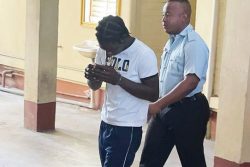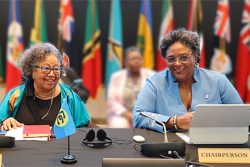The sharp scent of freshly ground spices, the cooking of traditional foods and the dull drone of drums like the dholak and the tabla would have helped make the tough ship-rolling-journey more bearable for the Indian indentured immigrants during the “Sheila’s” maiden trip to the West Indies.
 Sailing across the rough waters of the Indian and Atlantic Oceans, the new clipper was then one of the fastest vessels specially constructed to carry “coolies” quickly. Its Captain William H. Angel also employed various measures to keep his human cargo of 626 “poor wretches” including 120 women and 85 children, intact. In his book of the 1877 voyage, a rare eyewitness account based on “carefully kept logs” whose “accuracy can be vouched for,” the skipper described some of the living conditions.
Sailing across the rough waters of the Indian and Atlantic Oceans, the new clipper was then one of the fastest vessels specially constructed to carry “coolies” quickly. Its Captain William H. Angel also employed various measures to keep his human cargo of 626 “poor wretches” including 120 women and 85 children, intact. In his book of the 1877 voyage, a rare eyewitness account based on “carefully kept logs” whose “accuracy can be vouched for,” the skipper described some of the living conditions.
“The oversea carrying of coolies was in accordance with an exact system, arrived at by experience. To every 100 adults, four sirdars and four topases are appointed; the former acting as police, the latter being responsible for general cleanliness. At the completion of the voyage, they were given a special gratuity for good behaviour and general fitness in carrying out their assigned duties. That is the answer to the question – ‘How did you guard against possible treachery, with so many native Indians on board?’ – It was the sirdars who saw to that.” ‘Sirdars’ also termed ‘sardars’ and ‘jobbers’ often held multiple roles acting as recruiters, then foremen and as important intermediaries for ship owners and “coolie” employers.
Angel argued that Great Britain’s “hold on the countless millions of our subjects in the Indian Empire was largely due to a native characteristic – that if three men plot together, there is generally a race between two of them to give the other one away.”
“We looked to the ‘sirdars’ and ‘topases’ of whom we had 48 on board, to prevent quarrelling or plotting mischief, and the coolies were encouraged to keep themselves amused in their own fashion. This mostly resolved itself into tum, tum, tumming on their small drums…”
Angel complained that “the tunes they get out of those tom-toms, to European ears, is most dreary, tuneless, and monotonous; but the natives at times work themselves up to a high pitch of excitement – dangerously so, as we had bitter experience in the (1857 Indian) Mutiny,” contending “it is said, and with truth, you can always fathom the thoughts of the native mind by listening to the performers on their tom-toms, and then act accordingly.”
Referring to an earlier Calcutta wedding procession of a “fat Babboo husband” and the “poor little bride” stowed away in “a big resplendent palanquin carried shoulder high by bearers who, in their peculiar swinging gait, seemed to grunt out, ‘heavy beggar, heavy beggar, let him drop, let him drop, heugh!’” he related that the “whole tag-rag of the neighbourhood” came running “after them yelling and shrieking.”
“Our men were treated as honoured condescending guests, and given plenty to eat and drink;” he recalled, adding that his Third Officer Hearn “said they would never forget their experience, at times they didn’t quite know what would happen next, and at the end were glad to get out of it.” For “the native taste for music is peculiar to European ears. The more din and discord, bang and clash, as much of the big drum, or tom-tom, as strenuous arms and hands can get out of those instruments of torture, the more the applause.”
Accompanied by two native doctors Gug Mahon and Essen Mitter, the “Sheila’s” chief medical officer Dr. Chapman, joined, following his arrival from London to check and attend to the “coolies” at the Garden Reach depot. The vessel left at the start of the officially designated “coolie” sailing season on September 1, 1877 with supplies ranging from 500 head of various poultry, 40 sheep and four pigs, to a “Bramah” cow owned by Mitter.
Come September 23 with extra work, “we had by this time got the coolies well in hand; and from being a rather poor emaciated-looking lot of creatures on embarkation, under the influence of care, and the best of food, they were already putting on flesh.”
“The doctor and his assistants looked well after that; the food was supplied at the cost of the ship, and doctors were paid at the port of delivery for all the souls they delivered alive,” Angel states. Dr. Chapman was the highest ranking of the three since he had made at least five voyages in the trade several on the ‘Jorawhar,’ (Jorawur). “He had his meals at the Captain’s table; and it was stipulated that he had to be supplied with a pint of good wine, and a quart bottle of ale or stout daily, with good well-fed poultry for dinner on at least five days a week. Also he had charge of unlimited brandy and rum as medical stores; so if he had been so minded he need not have done badly! Of course we all fed equally well, and that accounts for the large number of poultry of sorts we started with; we had a multitude of dishes on the table, equal to a first class hotel on shore.”
Noting that the “coolies had their own cooks” in strict accordance with caste and faith, the Captain pointed out that “caste is in a great measure broken by the mere fact of their leaving India and coming to sea or ‘calle pannee’ (kali pani) as they name it.”
“They consumed a great quantity of rice and curry, which they mixed fresh from ingredients we supplied; a much appreciated meal was a curry of boiled rice and fresh mutton, or in lieu thereof tinned mutton (of which we carried a large quantity), or preserved fish.” Meals were cooked in a big kitchen fitted with special steam requirements. Following the “Sheila’s” delivery of its “human cargo” to Five Islands, Trinidad and its’ British Guiana visit, the boiler was thoroughly cleaned being “much encrusted with salt, as it had been in use every day (for 74 days) between Calcutta and Trinidad, condensing 50,000 gallons of fresh water, and working sometimes at night as well as day.”
The driver, or engineer, “when the coolies were on board, had the time of his life, being in charge of, and responsible for, all the steam for cooking, ‘chupatty’ plates (tavas/tawas), and condensing water, besides the steam winches when required. Saturday afternoons were reserved to the men as a general washing and mending day, and no work was done on Sundays, except when absolutely necessary.”
Early each morning, the “Sheila’s” Third Officer “served out his coolie stores under the supervision of the native doctors to the kitmagars (servants); and the small stores were multitudinous, especially those for curry making – turmeric, chillies, black-peppers, coriander-seed, mustard-seed, garlic, tamarinds, etc. All these had to be ground up by the coolies with mullars (mullers)
supplied for the purpose, and the rice, dholls – lentils, you would call them -winnowed before being cooked.” Today, the “mullers” or paired grinding stones named “sil bata” brought and used by Indian villagers for herbs and “masalas” are known in Guyana and Trinidad as “sils” and “lohras” perhaps after the Lohra Village in the district Jamui, Bihar where some migrants originated.
Angel continued: “On three days a week they each had three, or sometimes four chupatties (chapatti) for dinner in lieu of rice; a chupatty is a pancake made of flour and ghee (a native butter) baked on immense steam heated iron plates (tavas/tawas) fancy making two thousand and upward of those! Then they were given kedgeree of fish, and lots of various vegetables, pumpkins, potatoes, shallots, etc.”
Hindus aboard would not have eaten beef, and others such as the higher caste Brahmins were strict vegetarians, while devout Muslims who religiously avoid all pork and related products would have been horrified by the threat of contamination from pigs. The Captain claimed, the “coolies” had two good meals a day, and if they were at all seedy, or off-colour, special treatment and food – plenty of port wine, extract of beef, chicken broth, condensed milk, and a host of good things, so they ought to have been fit.”
The “Sheila” featured “a farmyard” of birds, a “beautiful” retriever, ‘Mora;’ ‘Lisa Jane’ the pet cat of the Captain’s wife and ‘Dennis,’ “a wee piggy.” The pig became a “favourite and grew amazingly, and was the cleanest of animals and very fastidious.” Trained by the sailors to complete obstacle races he “expressed enjoyment by responding to the fun.” Occasionally, ‘Dennis’ went “a bit too far” as “his depraved appetite prompted him to make a meal of an oil-skin coat and sou’-wester;” and “Slushie” the Barbadian cook “would have to watch or his galley would get raided.”
ID wonders about the “coolies” given that ‘Dennis’ was “extremely partial to crunching up and eating coal” and “would try his teeth on a stray boot if not watched.”










